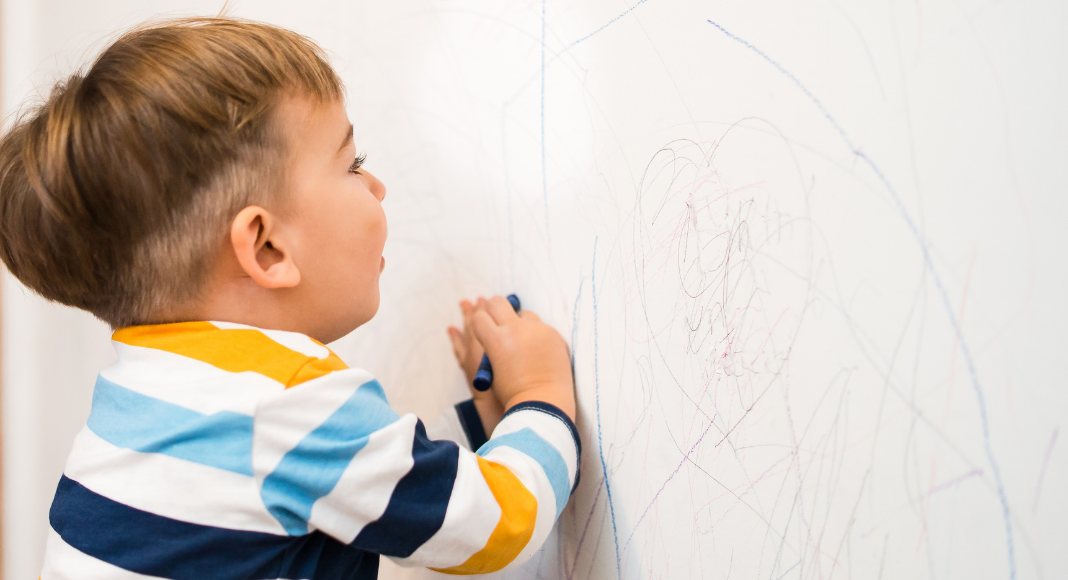 Silence in the house as a parent of young children, it’s a blessing, right? No, it is pure terror as you know someone is doing something they shouldn’t be doing in a room on the opposite side of the house. So when you walk into the room, you find your 2-year old drawing all over his play kitchen and chair with a blue (luckily, washable) marker. What is your first instinct? Is it to yell? Is it to send him to his room? Do you ignore it?
Silence in the house as a parent of young children, it’s a blessing, right? No, it is pure terror as you know someone is doing something they shouldn’t be doing in a room on the opposite side of the house. So when you walk into the room, you find your 2-year old drawing all over his play kitchen and chair with a blue (luckily, washable) marker. What is your first instinct? Is it to yell? Is it to send him to his room? Do you ignore it?
Well, obviously there is no right or wrong way to answer these questions, but hear me out on another way to handle situations like this that arise in your household. Even at age two, his consequence for drawing all over his toys/furniture should match the action. My husband and I let him calm down, as he knew he was in trouble for this action. We call this getting him back to baseline, as no one can hear anything you’re trying to say when they aren’t in a calm state of mind. We discussed what he did with him, letting him lead the conversation to own up to his action. Then we asked him to clean up his mess. He used a wipe and scrubbed down the marks. We discussed how important it was to take care of the toys that Mommy and Daddy buy for him.
Will he do it again? Maybe. But he is still associating drawing on the toys and having to clean up his mess together. If he does it again, we adjust the consequences as needed.
So you may be wondering why this type of consequence matters. Kids (and adults) need to reflect on what they did wrong and learn from it. Just having a kid sit in their room, isn’t going to solve the problem of them back-talking or hitting a sibling. I’m also not saying “an eye for an eye” type punishment either. Kids are going to see the consequence as a punishment, and not want to have to do that particular task again. But sitting in their room to “think about what they have done” isn’t teaching them to learn from their mistakes.
A big rule to follow is don’t threaten things you know you won’t follow through with. This was the best advice I was given during my first year of teaching. A mentor told me, if you don’t think you can actually follow through with the consequence, then don’t offer it to your child. For example, I wouldn’t tell a student I am taking recess away from him for the remainder of the school year. Yeah, he/she is going to call my bluff on that one. So think of realistic ways that you can make a difference in your child’s mistakes/behaviors.
Remember modeling behaviors, both good and bad, teach your child how to manage their emotions. We model how to eat, walk, ride a bike, and so many other physical things in life. Don’t forget about the emotional side of parenting.
This is a change in mindset, and my husband jokes about “training” him in this way of disciplining our boys. We see the consequences working and our kids are not doing those same mischievous actions as often, if not at all. Our goal is to teach kids they can learn from their mistakes and make it right after doing wrong.
Ideas of consequences that may match common misbehaving behaviors:
- Hitting another person with a toy would lead to taking the toy away for an extended period of time. Our favorite place in our house is the top of the fridge.
- Back-talking a parent or another person of authority would lead to the consequence of writing a heartfelt note/letter of apology to that person.
- Saying hateful/curse words could lead to making a list of positive words (this can work with little ones if parents scribe for them).
- Being unkind to family pets could lead to writing down the rules of caring for pets. Even my 4-year-old has done this one, and we display it on the front door as a reminder of how to treat animals. It’s okay if it’s mostly pictures!
- Getting caught smoking or vaping could lead to doing a research paper on the harmful effects of those products on your body.
- Throwing food on the floor during dinner would lead to having to sweep or vacuum the floor after dinner.
Does this new way of disciplining stress you out? Make a list of common behavioral situations your kids get into often and start a “cheat sheet” of ways they could learn from their mistakes. That way, when an action arises, you’ll be ready! And remember, kids will be kids, stay positive…it’s only temporary!








